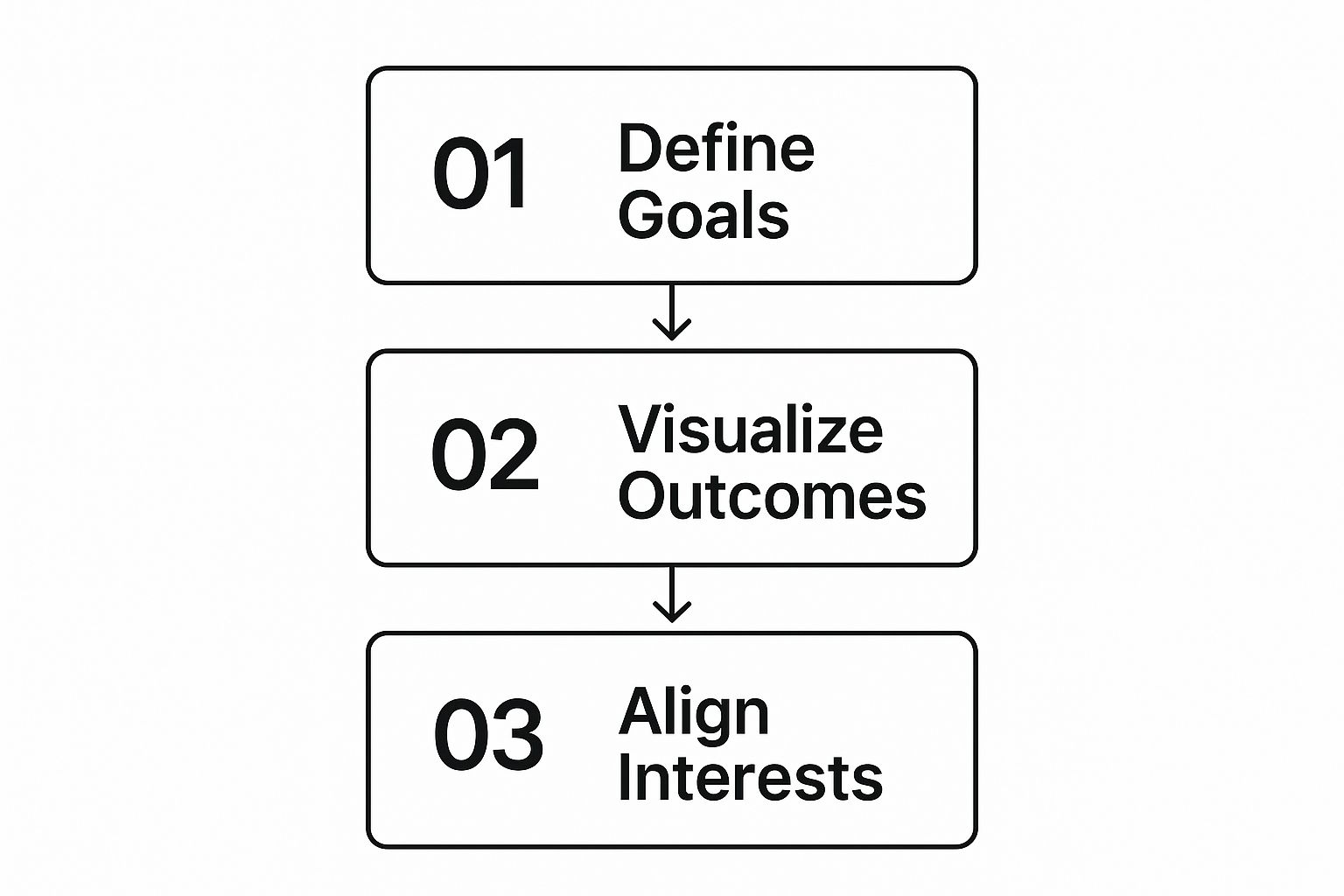Before you can even think about finding the motivation to study, it's vital to get to grips with the emotional and mental roadblocks that stop you in your tracks. Acknowledging that you feel overwhelmed, scared, or even just bored is the first, most important step—not trying to force yourself to work. It’s about being kind to yourself and understanding what’s really going on, so you can tackle the root of the problem instead of just fighting the symptoms.
Why It Feels Impossible to Study Right Now
That heavy, sinking feeling you get when you stare at a pile of textbooks but just can’t bring yourself to start? You’re not alone, and it has absolutely nothing to do with being lazy. The reality is that motivation isn’t a switch you can just flick on; it's a fragile emotional state, and when a child feels overwhelmed or disconnected, it drains away completely.
Often, the real issue is a mountain of pressure. When exams are looming, the sheer amount of work can feel so enormous that even starting seems pointless. It's a feeling of being completely swamped. This can lead to a state of paralysis where your child feels completely stuck, unable to take even the smallest first step. If this sounds familiar, learning about overcoming analysis paralysis can offer some really practical strategies to get them moving again.
Common Emotional Roadblocks
Sometimes, the hurdles aren't about the workload itself but more about what’s going on inside a child's head.
- Self-Doubt: There might be a quiet voice telling them, "What's the point? I'm not smart enough," or "I'm going to fail anyway." This kind of negative self-talk can completely sabotage their desire to even try. It’s heartbreaking to watch a child feel this way.
- Lack of Connection: The subject might feel boring or totally irrelevant to their life. If they can’t see how algebra connects to their dream of being a video game designer, every revision session will feel like a pointless chore.
- Burnout: Juggling stress from school, trying to keep up a social life, and meeting family expectations can leave a young person emotionally and mentally exhausted. When they're running on empty, there's just no energy left for studying. A huge part of rebuilding their motivation is learning how to concentrate during studies when their mind feels scattered.
This isn't just a feeling; it’s a widespread challenge. A UK survey found that motivation takes a significant nosedive during the GCSE years. In fact, 24% of Key Stage 4 pupils reported they were 'not very motivated' or 'not at all motivated'. Things like academic pressure and the overall school environment play a massive part in this. You can explore more findings on pupil motivation on gov.uk.
By identifying why your child feels stuck, you stop blaming them for a lack of willpower. Instead, you can help them address the real issue with kindness and find a genuine path back to learning.
Find Your 'Why' to Reignite Your Drive
Motivation has a habit of disappearing when studying starts to feel like a pointless chore. If you want to know how to get motivated to study, the first step is always to help your child reconnect with their 'why'—that is, the real, personal reason they're on this educational path in the first place. This isn't just about passing the next exam; it's about the future they're carefully building for themselves, one study session at a time, and the pride and excitement that comes with it.

This connection between their day-to-day tasks and a future goal acts as a powerful emotional anchor. It can transform a difficult revision session from an overwhelming burden into a meaningful step towards the life they genuinely want. When they can clearly see what they’re working towards, you give every small effort a much bigger purpose.
Make Their Motivation Visible
Abstract goals often feel distant and uninspiring. The trick is to help your child make their dreams tangible and keep them right at the forefront of their mind.
- Aspiring veterinarian? Help them find a picture of them with their favourite pet and put it near their desk.
- Future engineer? Before they start studying, spend ten minutes together watching videos of groundbreaking projects that actually excite them, like building a robot or designing a new type of rollercoaster.
- Hoping to travel the world? Make their laptop's wallpaper a photo of the country they dream of visiting one day.
These simple visual cues act as constant, powerful reminders of what all the hard work is for. They help your child see beyond the immediate struggle of today’s to-do list and connect with a feeling of hope and possibility.
This idea extends to bigger life decisions, too. For international students, for example, the chance to work in the UK after graduation is a huge motivator. Recent data shows a 27% increase in UK study visas issued in early 2024 compared to the previous year, driven partly by post-study work opportunities. It's a perfect example of how a clear, desirable outcome fuels the determination needed to succeed. You can discover more insights into international student motivation from HEPI.
Linking today's effort to tomorrow's dream is the essence of sustainable motivation. Your child's 'why' isn't just a thought; it's the emotional fuel that will carry them through challenges when willpower alone isn't enough.
Ultimately, finding and focusing on their 'why' is an act of self-direction. It’s about helping them take ownership of their educational journey and understand its value on their own terms. Developing these skills is a key part of becoming a successful self-directed learner.
Design a Study Space That Actually Motivates You
Your child's physical environment has a massive impact on their mental state. Think about it: a cluttered, distracting space can drain their energy before they even open a book, making it almost impossible to muster the motivation to study. The goal is to create a space that sends a clear, positive signal to their brain: when you're here, it’s a calm, safe place to learn.

This goes way beyond just tidying up; it's about consciously designing a personal sanctuary for focus, tailored to what helps your child feel good. What makes them feel calm and capable? For one child, that might mean positioning their desk to catch plenty of natural light. For another, it could be using a soft, warm lamp and some fairy lights to make the space feel cosy and inviting, especially for those late-night revision sessions.
Craft Their Focus Zone
Personalising their study area makes it a place they actually want to be. It doesn’t have to be expensive or complicated, either. Small, intentional changes can make all the difference in how they feel when they sit down to work.
Here are a few simple, practical ideas to get you started:
- Add some life: A small, low-maintenance plant like a succulent can genuinely reduce stress and make the space feel more alive.
- Organise their tools: Use pots for pens and trays for papers. Knowing exactly where everything is removes a subtle layer of mental friction that can hold them back. Let them choose the colours and styles they like.
- Prioritise comfort: Make sure their chair is supportive and their desk is at the right height. A comfy cushion or a footrest can transform the experience from a chore into something more pleasant.
Your child’s study space should be a haven, not a place they dread. By intentionally designing it to be comfortable and inspiring, you are actively removing one of the biggest emotional barriers to their motivation.
Perhaps the most critical step, though, is to create a digital-free zone. Let's be honest, their phone is often the biggest enemy of focus. Gently create a family rule where phones are left to charge in another room during study time. If they need their laptop, use apps that temporarily block distracting websites and social media notifications. This simple boundary is incredibly powerful.
Turn Overwhelming Tasks Into Small Wins
Staring down a massive assignment or a whole textbook can feel completely paralysing for a child. We’ve all seen that look of panic. The secret to finding their study motivation when they're this overwhelmed is to help them stop looking at the entire mountain and just focus on the first small step.
The goal is to chop those intimidating projects into tiny, non-scary actions. Each little task they tick off gives their brain a small burst of dopamine, the chemical that makes them feel rewarded and successful. This kicks off a positive feedback loop that builds momentum, making it so much easier to keep going. It’s a simple but powerful way to trick their brain into starting when it really wants to shut down.
From Overwhelming to Actionable
So, instead of a vague goal like 'write history essay,' help them reframe it as 'let's find three cool facts for the introduction.' Don't tell them to 'revise all of chemistry'; instead, suggest, 'how about we review your notes on covalent bonds for just 15 minutes? I'll set a timer.' See the difference?
This approach is the engine behind popular productivity methods like the Pomodoro Technique, where you work in focused 25-minute bursts with short breaks in between. That structure makes it feel less daunting for a child because the commitment is so small.
When a task feels too big, the problem isn’t your child's motivation; it’s the size of the task. Their brain is wired to avoid overwhelming threats, and a huge project can feel like one. Make it small, and you make it feel safe to begin.
The process below shows how you can help them define, visualise, and connect with their study goals to make them feel much more approachable.

This method of breaking things down is also why effective priority management systems are so helpful. They force you to decide what the most important small step is right now, preventing big tasks from derailing their motivation before they even start.
The table below gives a few more examples of how to reframe those big, scary tasks into something your child can actually start today.
From Overwhelming to Actionable Study Tasks
| Overwhelming Task | First Actionable Step (15-25 mins) | Why This Works |
|---|---|---|
| "Write a 3,000-word dissertation." | "Brainstorm 10 possible titles and write a single fun sentence for each one." | It gets ideas flowing without the pressure of perfect prose. You’re just playing with concepts and removing the fear. |
| "Learn all of Module 4 for the exam." | "Read the first two pages of the chapter and highlight three things you find interesting." | The commitment is tiny, making it easy to start. It lowers the barrier to entry and builds curiosity. |
| "Complete the entire maths problem set." | "Solve the first problem completely, even if it takes the full 25 minutes. We can work on it together." | It provides a quick win and proves the rest of the set is doable, one problem at a time. It also adds a layer of support. |
By transforming your child's to-do list like this, you shift the focus from the intimidating final product to a simple, achievable action.
Ultimately, learning to break down their work is a core study skill. By focusing on one small win at a time, you build their confidence and prove to them that they can handle the challenge. For more practical strategies on structuring study sessions, our guide on time management for students offers plenty more insights.
Build a Support System to Keep You Going
Trying to navigate academic pressure all on their own can make a child feel incredibly isolated. Let's be honest, lasting motivation is rarely a solo act. It’s usually nurtured by the people they have around them. Learning how to get motivated to study is as much about building their team as it is about pure willpower.
This isn’t about being weak—it’s about being smart. You wouldn't climb a mountain without a rope and a team, so why should a child face their academic journey alone? Putting that network in place makes the whole experience feel less lonely and, frankly, much more sustainable.
Find Their Study Allies
A good "study buddy" offers so much more than just quizzing before an exam. They’re someone who genuinely gets it—the late nights, the confusing topics, and that massive sense of relief when you finish a tough assignment. They can be a go-to person to share frustrations with and, just as importantly, to celebrate those small but meaningful wins.
Here are a few practical ideas for your child:
- Find a study partner: Encourage them to ask someone in their class if they’d be up for reviewing notes together once a week, either in person or online.
- Talk to your family: Gently explain what your child needs from the family. A simple request like, "Could we have some quiet from 7 to 8 pm for their revision?" can make a huge difference to their stress levels.
- Ask a friend for check-ins: A quick text from a mate asking, "How did the study session go?" provides a powerful little boost of accountability and shows someone cares.
Realising they don't have to carry the weight alone is a huge part of staying motivated. Support turns a personal struggle into a shared journey, making the challenges feel much more manageable.
Of course, wider support systems, like the school itself, play a massive role too. Recent Ipsos research in Great Britain highlights that student motivation is closely linked to bigger issues like overcrowded classrooms and staff wellbeing—concerns shared by 31% and 24% of the public, respectively. This just goes to show how much your child's school environment can affect how they feel.
If your child is feeling overwhelmed, don't hesitate to help them tap into the resources their school offers. Speaking to a trusted teacher or a school counsellor when things feel heavy isn't a sign of failure. It's a sign of strength.
Frequently Asked Questions About Study Motivation
Even with the best strategies in your toolkit, motivation can feel like a slippery thing. Sometimes it's there, sometimes it's not. Here are some quick, honest answers to the most common motivation roadblocks students run into.
Think of these as your emergency fixes for when you or your child feel like you've hit a brick wall.
What If I Have Absolutely Zero Motivation to Start?
We've all been there. Staring at a textbook, knowing you should start, but the mental effort feels monumental. When your motivation is at rock bottom, the thought of a two-hour study session is completely overwhelming.
So, don't aim for two hours. Don't even aim for thirty minutes.
Just use the ‘five-minute rule.’ Seriously. Tell your child they only have to study for five minutes. Set a timer, open the book, and just begin. Anyone can do five minutes. That initial push is often the hardest part. Once the timer dings, they will probably find they've built enough momentum to keep going for another five.
And if they don't? That’s perfectly fine. They still did something. They broke the cycle of procrastination, and that in itself is a win. Praise them for that effort.
How Do I Stay Motivated for Long-Term Goals?
Big goals, like passing final exams, can feel so far away that they lose their power to motivate a child on a rainy Tuesday afternoon. The secret isn't to stare at the mountain, but to focus on the next few steps in front of you.
First, keep their main goal visible. Help them stick a note on their laptop that says, "Pass A-Level Maths." But the real magic happens when you help them break that huge goal down into tiny, manageable chunks.
- This week's mission: "Let's get your head around trigonometric identities. We can do it."
- Today's task: "How about we work through ten practice problems together after school?"
When they hit these small targets, celebrate them. Finishing a chapter, understanding a tricky concept, or scoring well on a practice quiz—these are genuine achievements. Acknowledging these little victories with a high-five or a favourite treat makes the long journey feel less like a slog and keeps their drive topped up.
Long-term motivation is really just a string of small, consistent wins. Focus on what your child can achieve today to build their momentum for tomorrow.
Is It Bad to Use Rewards to Motivate Myself?
Not at all! In fact, it's one of the smartest things you can do because it works with your brain's natural wiring, not against it. A child’s brain is designed to repeat actions that lead to good things. It’s simple positive reinforcement.
The key is to make the reward proportional to the effort. This isn't about bribing your child with a new video game for reading a single page. It's about creating a system that makes studying feel satisfying and worthwhile.
Here’s how it could look:
- Small Task: After a focused 30-minute study block, they take a 10-minute break for a snack or their favourite playlist.
- Medium Task: Once they've finished that tough assignment, reward them with an episode of a show you can watch together.
- Big Goal: After they've completed all their revision for a mock exam, plan something properly fun for the weekend, like an outing with friends.
By linking effort to a reward, you're training your child's brain to associate studying with a positive outcome, which makes it just that little bit easier to get started next time.
At Queens Online School, we understand that motivation isn't one-size-fits-all. Our live, interactive classes and supportive teachers help students find their drive by connecting learning to their unique goals and passions. Discover how our online British curriculum can create an engaging educational experience for your child by visiting https://queensonlineschool.com.

